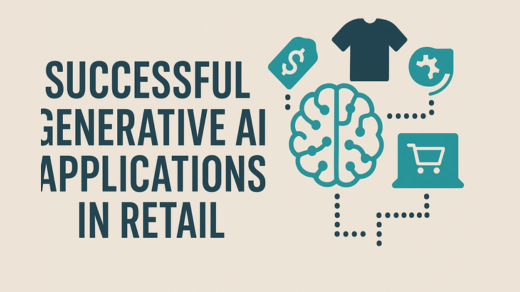Successful Generative AI Applications in Retail

Several retailers have successfully embraced generative AI, showcasing its potential to drive innovation and enhance customer experiences. One notable example is Sephora, a global beauty retailer that leverages AI to create personalized shopping experiences. Through its Virtual Artist feature, customers can use augmented reality to try on makeup products virtually. This innovative application of generative AI not only enhances customer engagement but also increases conversion rates by allowing customers to visualize products before purchasing.
Another case study is Walmart, which employs AI-driven analytics to optimize inventory management. By analyzing shopping patterns and trends, Walmart can predict demand for various products, ensuring that shelves are stocked accordingly. This approach minimizes waste and improves customer satisfaction by guaranteeing product availability. Moreover, Walmart’s use of AI extends to dynamic pricing strategies, enabling the retailer to adjust prices in real-time based on market conditions.
Lastly, H&M, a global fashion retailer, has implemented AI to enhance its visual merchandising efforts. By leveraging AI algorithms to analyze customer preferences, H&M can create tailored in-store displays that resonate with shoppers. This data-driven approach enables the retailer to maximize sales and improve customer engagement. These case studies illustrate the transformative potential of generative AI for retail, showcasing its ability to drive efficiency and enhance customer experiences https://dedicatted.com/services/generative-ai/retail/.
Overcoming Challenges in Implementing Generative AI for Retail
Despite the numerous benefits associated with generative AI for retail, businesses often face challenges during implementation. One significant hurdle is the integration of AI technologies with existing systems. Many retailers rely on legacy systems that may not be compatible with advanced AI solutions. To overcome this challenge, retailers must invest in modernizing their infrastructure and ensuring that all systems can communicate effectively with AI applications.
Another challenge is the availability of high-quality data. Generative AI relies on vast amounts of data to generate accurate insights. Retailers must ensure that they have access to comprehensive and clean datasets to maximize the effectiveness of AI applications. This may involve investing in data management solutions and establishing data governance protocols to maintain data quality.
Additionally, there is often a skills gap within organizations when it comes to AI expertise. Retailers may struggle to find qualified personnel who can effectively implement and manage AI technologies. To address this issue, businesses should prioritize training and upskilling existing employees while also considering partnerships with AI specialists. By investing in human capital, retailers can better position themselves to leverage the full potential of generative AI.
Predictive Analytics: Forecasting Trends with Generative AI
Predictive analytics is a powerful tool that retailers can utilize to forecast trends and consumer behavior effectively. Generative AI enhances predictive analytics by processing vast amounts of data, identifying patterns, and generating insights that inform strategic decision-making. By analyzing historical sales data, market trends, and consumer preferences, retailers can anticipate future demand and adjust their strategies accordingly.
For instance, a retailer can use generative AI to predict which products are likely to be popular during an upcoming season. By analyzing past sales data and external factors such as economic indicators and cultural trends, the AI can provide valuable recommendations on which items to promote and stock. This proactive approach enables retailers to capitalize on emerging trends and maximize sales opportunities.
Moreover, generative AI can assist retailers in identifying shifts in consumer behavior, allowing businesses to adapt their marketing strategies accordingly. For example, if the AI detects that customers are increasingly interested in sustainable products, retailers can adjust their inventory and marketing efforts to align with this trend. By staying ahead of consumer preferences, retailers can enhance their competitiveness in the marketplace.
Generative AI for retail represents a significant advancement in the industry, offering a myriad of opportunities for enhancing personalization, efficiency, and customer satisfaction. As retailers continue to navigate the complexities of a competitive market, the adoption of AI technologies will be crucial for staying relevant and meeting the evolving needs of consumers. By embracing generative AI, retailers can enhance their operational strategies, create more engaging shopping experiences, and ultimately drive sales growth.
The future of retail lies in the ability to leverage data and technology to create a truly personalized shopping experience. Retailers who invest in generative AI will not only improve their efficiency but also build stronger connections with their customers, fostering loyalty and driving long-term success. As the retail landscape continues to evolve, those who embrace innovation will be well-positioned to thrive in the years to come.
If your retail business is looking to enhance its operations and customer experiences through generative AI, now is the time to take action. Explore the possibilities of AI-driven solutions and position your brand for success in the competitive retail market. Embrace the future of retail today!



